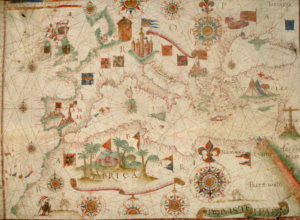
Description of the Training School
COST-Action PIMO (People in Motion: Entangled Histories of Displacement Across the Mediterranean (1492-1923)), WG 4– People, convenes a summer school between May 22 and May 26, 2023, at the NIMAR (The Netherlands Institute in Morocco), in Rabat, Morocco.
The Netherlands Institute in Morocco (NIMAR) is part of the Faculty of Humanities of Leiden University. NIMAR offers educational programs and promotes scientific research in the field of Islam, languages and culture, migration, identity and heritage and urban studies.
Due to its strategic geographic location, Morocco constitutes a bridge between Europe and Africa. Its long-lasting economic, religious, cultural and political relations to both sides of the Mediterranean, and the variety of cross-border mobilities in past and present, make Rabat a perfect fit to accommodate the Crossings conference.
This summer school provides training for young career scholars (PhD’s and Postdoctoral
candidates) in two specific areas: establishment and development of a career in academia and translation of academic skills into a broad (global) labour market. In order to fulfil these two goals, this summer school offers tailor coaching sessions on the following activities:
1) Academic Activities
a. How to set up and develop a research project (PhD, Postdoctoral project, Grant)
i. Applied to individual projects
ii. Work within the cohort
b. Academic Publishing
c. Networking
2) Labour Market Skills
a. How to translate PhD and Postdoctoral skills into Labour Market requirements
b. Activities in the broad labour market (some practical examples)
i. Public History
ii. Addressing global societal challenges
We are looking for participants that may be interested in global questions regarding mobility and migration, with particular emphasis to the Mediterranean or in comparative perspective with the Mediterranean for the period between the 15th and the 21st century. We are looking for young researchers that are willing and able to bridge the historiographical gap between Western and Global
South historiographies and approaches. The six core areas of discussion and intervention are:
Migration and Trafficking; Conflict (institutional, political etc); Slavery and Labour Exploitation; Culture and Religion; Identities; Memory and Heritage.
The summer school is organized in a 5-day activity planning. Day 1 through 3 will privilege discussions and the development of practical tools to address the challenges of writing a PhD dissertation and/or Postdoctoral outputs, fulfil the demands of an academic career planning and the adaptation of such skills into the global labour market, and develop a creative project, with practitioners, regarding public history. Days 4 and 5, members of the summer school are invited to attend and participate as junior speakers at the conference Crossings organized within the same COST-Action PIMO scheme.
By the end of the summer school, participants will have produced the following outputs:
1) Research proposal and plan for individual research – supervision towards publishable version for open access publication in peer reviewed journal.
2) Provide and receive feedback within a cohort
3) Produce a creative piece of public history in joint venture with practitioners – to be possibly used in curriculum vitae portfolio for future job applications.
4) Presentation at scientific conference (if academically viable, supervision towards submission for academic publication with papers of senior participants).
If this coaching/traineeship approach fits your goals and aids your future intellectual development, we are looking for your application.
Open Call
Please click here for the full Call: RABAT-Summer-School-2023
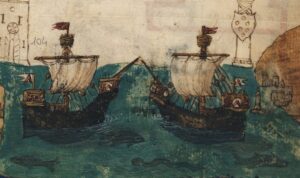
PIMo 1st Training School El Museo Canario (Las Palmas de Gran Canaria, Spain) 1-4 September 2021
Diasporic Communities in the Mediterranean: Between Integration and Disintegration
Goals of the Training School:
Wide enough to support radically distinctive civilizations, and yet narrow enough to ensure ready contact between them, the Mediterranean became, in David Abulafia’s opinion, “probably the most vigorous place of interaction between different societies on the face of this planet”. How should we go about historically studying the life aspirations and agency of minority groups moving and settling between the shores of the Mediterranean basin where religion, language, literacy, class, gender, political culture, music, architecture, clothing, food and other identity signifiers unity and divide a large variety of religious and ethnic groups? The PIMo Training School aims to explore the “visible and invisible networks” between cultures in the Mediterranean area, from the fifteenth century to the present and to show the ways such connections were (and are) artificially separated by ideological and literal borders. Its main objective is to offer an opportunity for research development, training and exchange of ideas for PhD and postdoctoral students working in the fields of Mediterranean Studies, Migration Studies, Cultural Transfers and History of Emotions. The entangled intellectual, cultural, and material histories of the Mediterranean will be unfolded following the displacement and resettlement of minority groups and individuals and the emotional responses of both displaced peoples and the communities they orbit and join. This school also aims to provide a critical introduction to some of the most influential frameworks of explanation in historical work today and to equip trainees with the skills they will need to find and gain access to all the primary source materials they need for their projects. School sessions will consist of a series of lectures and seminars delivered by prominent historians and sociologists from various countries and in-depth discussion sessions on the participating trainees’ PhD and postdoctoral research projects. The language of communication for the School is English. The assessment will be in the form of a written essay of 3,000 words to be handed in 2 weeks after the end of the School.
Open Call
Please click here for the full Call: Open Call- Deadline June 30
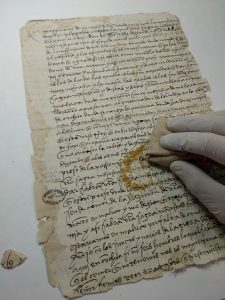
PIMo WG3 – Summer Training School, Arnamagnaean Institute Copenhagen 31 August – 3 September 2022
Paper in Motion: Restoration, Conservation, Transmediation
Call Deadline June 30th
Convened by Prof. José María Pérez Fernández, leader of the Paper in Motion work group, and organized with our host, the Arnamagnaean Institute in Copenhagen, and the collaboration of the Thinking Paper Project at the University of Cambridge
This training school will bring together scholars in the history of paper-based documents, in both manuscript and print, alongside experts in techniques for their conservation and restoration. A third group of trainers will teach seminars on the transmediation of these documents into digital e-texts. All these experts work in institutions, libraries, archives and universities devoted to the study, care and conservation of these documents, many of which were produced in different periods, and above all in different places, frequently very distant from their current locations. The training school will look into the history of some case studies, will trace the paths these books and documents have followed over the course of their history, and examine how this has affected them in material terms. Trainees will attend workshops on traditional paper production techniques, methods and materials for the care and conservation of paper-based documents, and seminars on how their contents are turned into e-texts. In short, the training school offers a unique opportunity to learn about the history and background of these documents in motion, as they also acquire hands-on practical knowledge through close examination of particular case studies, against the overall background of the momentous transition we are undergoing from traditional means of communication on to electronic-digital media.
Convened by Giovanni Tarantino, chair of the PIMo COST Action, José María Pérez Fernández, leader of the Paper in Motion work group, Marta Bucholc (University of Warsaw), and Matthew Driscoll (University of Copenhagen). Organized with our host, the Arnamagnaean Institute of the University of Copenhagen, and the collaboration of the Thinking Paper Project at the University of Cambridge.
Please see Call below for details of the application process.
Call for Papers
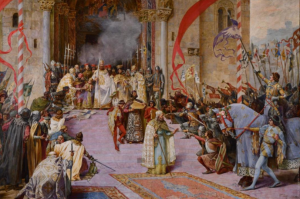
PIMo 3rd Training School, University of Belgrade, 25-28 May 2022
Empires and Emotions, Rethinking Intellectual and Cultural Transfers/Translations in Southeastern Europe and the Mediterreanean (15th-19th Century).
Goals of the Training School
The broad world of Southeastern Europe and the Mediterranean from ancient times nourished the great stories that spanned over distant times and places. The focus of the research done within the Cost Action 18140 People in Motion: Entangled Histories of Displacement across the Mediterranean, or PIMo, explores common forms of displacement and dispossession across the Mediterranean from the fifteenth century to the present.
The training school in Belgrade will explore this world, divided among different Empires in the Early modern period, and became the place where different thoughts and ideas crossed visible and invisible borders and overcame language barriers finding carriers among people and objects. Thought in motion, captured on paper, represented in an image, or whispered in the ear, created the intellectual bridge that connected Otherness and unified Diversities. Intellectual/cultural transfer and translation became powerful tools for acquiring, expanding, and sharing knowledge and constant companion of human history. The translation was always a human journey through inner and outer worlds, an emotional and intellectual adventure that challenged certainties, prejudices, and personal convictions. It compared languages and contexts, world views, cultures, and empires.
The task of the training school in Belgrade is to shed light on these issues and to equip young scholars with the specific intellectual tools necessary for understanding the central role of translation/cultural transfer in the Mediterranean context and with practical skills for writing grants applications. It aims to explore the “visible and invisible networks” between cultures, religions, and politics in the Mediterranean area from the 15th to 21st century and to show the ways such connections were (and are) artificially separated by political, ideological, and physical borders.
The main objective is to offer an opportunity for research development, training, and exchange of ideas for Ph.D. and postdoctoral students working in Mediterranean Studies, Migration Studies, Cultural Transfers, and History of Emotions. The entangled intellectual, cultural, religious, political and material histories of the Mediterranean will be unfolded following the displacement and resettlement of minority groups and individuals and the emotional responses of displaced peoples and the communities they orbit and join.
School sessions will consist of lectures and seminars delivered by prominent professors of history, sociology, arts, theology, and political sciences from various countries and in-depth discussion sessions on the participating trainees’ Ph.D. and postdoctoral research projects.
Please see the full Call for details of the eligibility criteria and the application process. Deadline for applications is April 12 2022.
Open Call
Please click here for the full Call: Belgrade Training School, Deadline April 12 2022
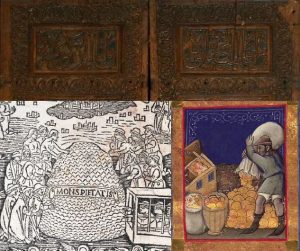
PIMo 2nd Training School Centro Studi sui Monti di Pietà (Bologna) and Biblioteca Roncioniana (Prato) 13-16 June 2022
Moving Goods for Charity Across the Mediterranean (15th–19th centuries)
Goals of the Training School
Within the interconnected space of the Mediterranean (“probably the most vigorous place of interaction between different societies on the face of this planet”, according to David Abulafia), different communities dealt with the weak, the poor, and those in (even momentary) need by developing distinct and yet comparable responses. The PIMo Training School aims to explore which kinds of institutions and practices – in the name of the inner solidarity of a local community or of the broader call to help everyone – were put in place and how they were supported, both economically and conceptually. More concretely, how to move and use goods or objects (and which ones) for charity? How to persuade people that organized solidarity was a highly rewarding investment? Which role did different religious traditions (Jewish, Christian, Islamic) play in these dynamics? To what extent is a comparative approach not only possible but also necessary in order to rethink and reframe the whole process?
The PIMo Training School will investigate the multiple links between economy and charity in the Mediterranean area, from the fifteenth to the early nineteenth century, by investigating the material and immaterial goods that formed the basis for institutions such as: those supported by the legal framework of the waqf in the Islamic and Ottoman societies; Christian hospitals, charitable confraternities, and the Monti di Pietà; and forms of Jewish solidarity, like the collective efforts to redeem Jewish captives. How far can we speak of community economies for this period or even of a sort of welfare system?
The School’s main objective is to offer an opportunity for research development, training, and exchange of ideas for PhD students and postdoctoral researchers working in the fields of Mediterranean Studies, Economic History, Religious Studies, Late Medieval and Early Modern History, and Material Culture. The entangled intellectual, cultural, and material histories of the Mediterranean will be unfolded by following the people, objects, and institutions that were involved in the enterprise of charity or mutual help. This school also aims to provide participants with a critical introduction to some of the most influential interpretative frameworks on these topics and to foster a discussion among trainees about their own research projects.
Deadline for applications is March 31st.
Call for Applications Deadline March 31
Please click here for the full Call: PIMo – Training School Bologna, Deadline March 31 2022

